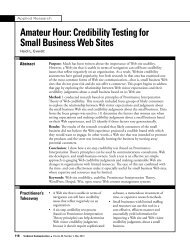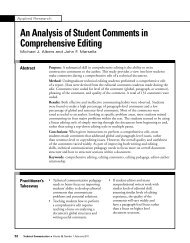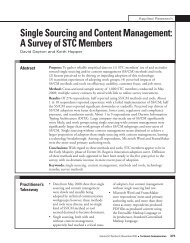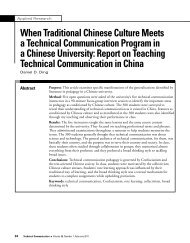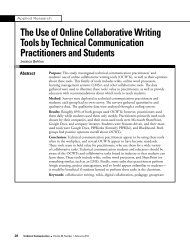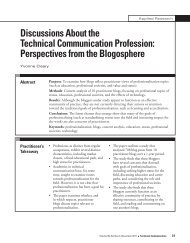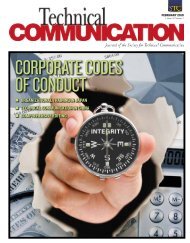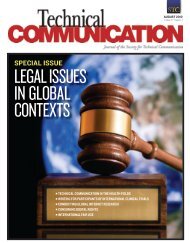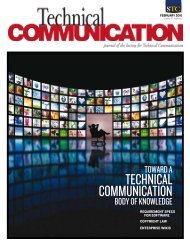SPECIAL ISSUE
Download: November 2011 - Technical Communication - Society for ...
Download: November 2011 - Technical Communication - Society for ...
- No tags were found...
You also want an ePaper? Increase the reach of your titles
YUMPU automatically turns print PDFs into web optimized ePapers that Google loves.
Guest EditorialProfessionalization of Technical Communicationsecondary research useful. And STCC’s Solution DesignCompetency asks the candidate to demonstrate theability to design high-level solutions for implementinginformation products, showing research methodologyand synthesis of research results into an overall designsolution. The takeaway from this exercise is thatpractitioners and academics are not that far apart whenwe talk about core competencies.Mediating Disciplinary StatusAchieving disciplinary status for technicalcommunication practitioners and academics hasenormous economic importance for us. Practitionersdefine the business environment and economic value forour field; academics compete for critical resources andstakeholder status in their specific institutional sites withthe coins of their realm: teaching, research, and service.Disciplinary status is closely aligned withprofessional status. Sociologists tell us that the conceptof professionalization yields information about the waywork is organized under a common educational identity,the kind of memberships that occur in professionalorganizations, and the nature of the emergent sharedwork culture (Evetts, 2011). For practicing professionals,STC has worked hard to provide authoritativedifferentiation. In 2010, work with the BLS resulted ina separate chapter for technical writers in the OccupationOutlook Handbook, an essential reference documentfor corporations. This means that for the first time theBLS has acknowledged technical writers as distinct fromother writers, a critical boundary for our autonomy.A common educational identity for academicsrequires a different negotiation of space, but it doesnot appear that our campuses are as well differentiatedas our corporations. Our disciplinary status on thenation’s campuses has been as storied and hard wonas our status of practicing professionals. Before 2010,the Classification Code for Instructional Programs inthe United States, which is used to report institutionaldata to the Integrated Postsecondary EducationalData System, included two almost identical codes fortechnical communication: Technical and BusinessWriting and Technical and Scientific Communication.These codes differentiated the focus of our academicprograms on the genres we produce rather thanrecognizing common knowledge, actions, and ideas.The Consortium of Doctoral Programs in Rhetoricand Composition successfully lobbied both theNational Research Council and the National Centerfor Educational Statistics for disciplinary status. Theresult was inclusion in the National Research Counciltaxonomy of graduate programs under the designationRhetoric and Composition and one code for allinstructional programs in Professional, Technical,Business, and Scientific Writing (23.1303) (Phelps &Ackerman, 2010).Rude (2009) notes an instance in which technicalcommunication is omitted from one important referencework’s list of disciplines that constitute English studies.English Studies: An Introduction to the Discipline(s)(McComiskey, 2006) includes chapters on linguistics,creative writing, rhetoric and composition, literature,critical theory and cultural studies, and Englisheducation. Rude interprets this omission as an artifactof politics and power: anxiety about the surge of the“immigrant” field and an effort to suppress it (2009,p. 190). Her assessment points the way to our nextdiscussion of the processes in play for professionalizationof technical communication: politics and power.In This IssueAn important aspect of professionalization, accordingto Savage (1999), is awareness of our historical identity.Several historical studies in the first volume of Kynell-Hunt and Savage (2003) show the promise of shapingprofessional consciousness through historicizing technicalcommunication. In this special issue, Edward A. Maloneleads the way forward by looking back with “The FirstWave (1953–1961) of the Professionalization Movementin Technical Communication.” Malone notes that recentdiscussions about the professionalization of technicalcommunication have shown little awareness of this earlyhistory. When scholarly articles on the topic include aliterature review at all, they usually limit their reviewto post-1970 or even post-1980 scholarship. Malone’sarticle fills a gap in our understanding of the history oftechnical communication as a profession by reviewingsix professionalization issues and providing an historicalperspective for each. He finds that our history teaches usto be cautiously optimistic about our achievements.282 Technical Communication l Volume 58, Number 4, November 2011



